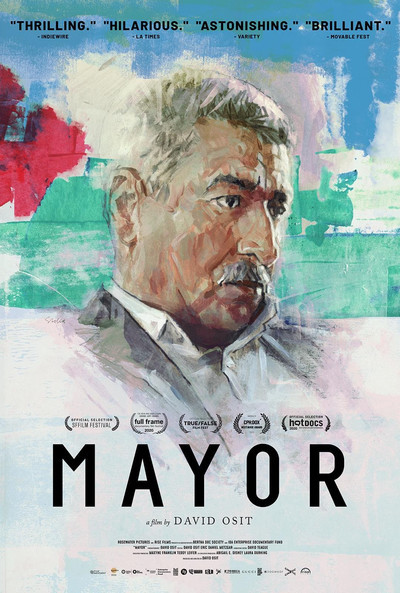By Glenn Dunks
 Documentaries about bureaucracy can be tricky. Not everybody has the luxury of being Frederick Wiseman and be given over four hours to luxuriate in the minutiae of a major city’s political processes like he did in this year’s City Hall. And if nothing particularly interesting happens then all you’re left with is a movie about people pushing paper around for 90 minutes, which would thrill me by doubtful many others. American director David Osit is at something of an advantage with Mayor, however; set in the city of Ramallah in the Palestinian West Bank.
Documentaries about bureaucracy can be tricky. Not everybody has the luxury of being Frederick Wiseman and be given over four hours to luxuriate in the minutiae of a major city’s political processes like he did in this year’s City Hall. And if nothing particularly interesting happens then all you’re left with is a movie about people pushing paper around for 90 minutes, which would thrill me by doubtful many others. American director David Osit is at something of an advantage with Mayor, however; set in the city of Ramallah in the Palestinian West Bank.
You could be forgiven for thinking that Osit has missed the obvious story right in front of his face. For the opening stretches of Mayor, about Ramallah’s Mayor Musa Hadid, the director is seemingly content to focus on administrative nonsense including an amusing, extended narrative strand around Hadid’s inability to grasp the concept of city branding (as a public servant myself, I related). I was beginning to think that this film would be just a curious diversion showing how life in the Palestinian National Authority does carry on.
But Osit proves to be much smarter than that in how he has structured Mayor...

He is also credited as the film’s editor and, as it turns out, these digressions aren’t what’s going on at all. No, these comedic, pseudo-sitcom moments are just groundwork for a film that builds into something much more important. Smaller than you may still expect, but nonetheless brimming with a quiet force. Osit slowly begins to weave in that outside world into Hadid’s story. First there is a television news story about Donald Trump’s transfer of the U.S. embassy to West Jerusalem, and strays comment about how little they try to pay attention to him. Then there is a dignitary visit by Prince Williams with whom Hadid has a captive audience (albeit not shown much here due likely to protocols).
The film builds Hadid up as a personality capable of leading amid great adversity despite his political shagginess—as well as not understanding comms-speak, he doesn’t even own a television and in one humorous scene seems comically annoyed by a constituent wishing to share a meal. He admires a fountain outside his offices, something of a legacy to his tenure, and sets about erecting a large Christmas tree with oversized novelty decorations despite the very real possibility that it will get shot down and damaged by Israeli conflict on the streets of Ramallah.
And indeed, when his mayoral office becomes a pivotal siege landmark in a gunfight by Israeli soldiers on the hunt for suspects (much like those in Asa Ushpiz’s Children that I reviewed out of Dok Leipzig, or early titles like the Oscar-nominated Five Broken Cameras), all those jokes are forgotten in a sequence of incredible suspense. It is a collision of the two worlds that he is seen working to improve, a riveting sequence that acts as a bolt from the blue. Yet it is one that Osit has delicately been building towards all along. Like I said, he’s smart.

As a stroke of filmmaking luck, it’s a thrilling moment. But it’s also a powerful grammatical note in a movie that subtly pivots throughout life in the Ramallah mayoral offices. Those keen for a bone-dry office comedy as much as a fraught political observational documentary should heed Mayor. And because ‘tis the season, Osit’s film is also a Christmas movie for your unconventional seasonal movie-mix. If that’s your thing, of course.
Release: Currently screening in virtual theatres through Film Movement.
Oscar chances: A definite shot at the long-list, but I think there are a couple of foreign-language docs ahead of it and ultimately may come across as slight compared to the likes of Romania's Collective.